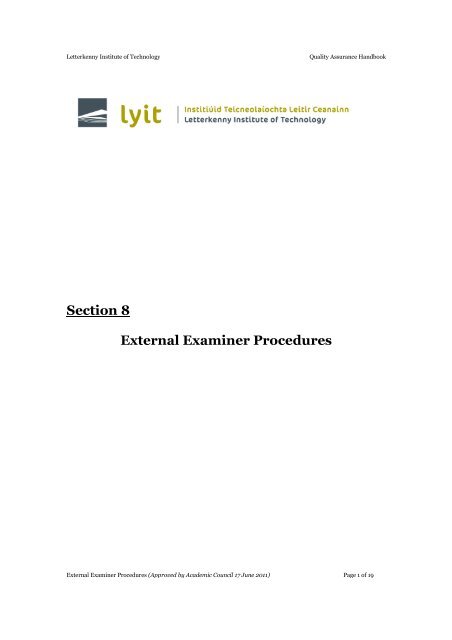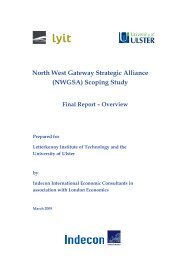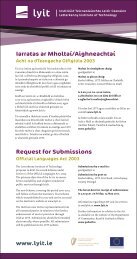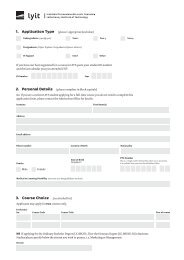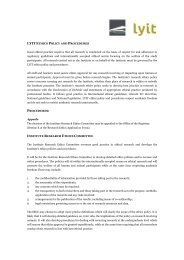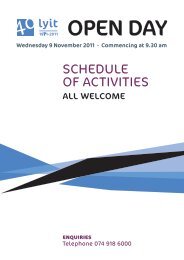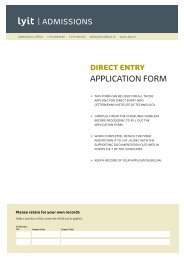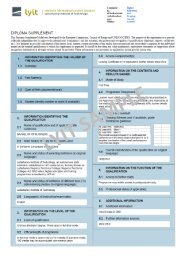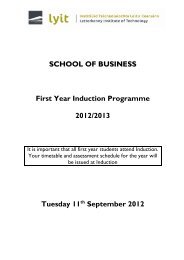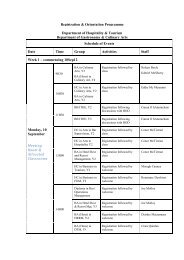External Examinations Procedure - Letterkenny Institute of Technology
External Examinations Procedure - Letterkenny Institute of Technology
External Examinations Procedure - Letterkenny Institute of Technology
Create successful ePaper yourself
Turn your PDF publications into a flip-book with our unique Google optimized e-Paper software.
<strong>Letterkenny</strong> <strong>Institute</strong> <strong>of</strong> <strong>Technology</strong><br />
Quality Assurance Handbook<br />
Section 8<br />
<strong>External</strong> Examiner <strong>Procedure</strong>s<br />
<strong>External</strong> Examiner <strong>Procedure</strong>s (Approved by Academic Council 17 June 2011) Page 1 <strong>of</strong> 19
<strong>Letterkenny</strong> <strong>Institute</strong> <strong>of</strong> <strong>Technology</strong><br />
Quality Assurance Handbook<br />
<strong>External</strong> Examiner <strong>Procedure</strong>s<br />
1. <strong>External</strong> Examining Process<br />
1.1 <strong>External</strong> examining is a quality assurance mechanism employed by providers that supports public<br />
confidence in academic qualifications.<br />
1.2 The external examining process <strong>of</strong>fers an objective interface: a principal outcome <strong>of</strong> external<br />
examining is the introduction <strong>of</strong> an independent element into the procedures for the assessment <strong>of</strong><br />
learners.<br />
1.3 An external examiner is an independent expert who is a member <strong>of</strong> the broader community <strong>of</strong><br />
practice within the programme’s field <strong>of</strong> learning and whose accomplishments attest to his/her<br />
likelihood <strong>of</strong> having the authority necessary to fulfil the responsibilities <strong>of</strong> the role.<br />
1.4 The main functions <strong>of</strong> the external examiner (or external examiner team) are these:<br />
a) Review the appropriateness <strong>of</strong> the minimum intended programme learning outcomes (i.e.<br />
the programme’s basic educational goal), and other programme objectives.<br />
b) Probe the actual attainment <strong>of</strong> learners (actual programme learning outcomes) using<br />
information agreed with and supplied by the provider.<br />
c) Compare and contrast both the minimum intended programme learning outcomes and the<br />
actual attainment <strong>of</strong> learners with the relevant awards standards, with the National<br />
Framework <strong>of</strong> Qualifications, and with corresponding data from other programmes in the<br />
same discipline in other higher education institutions in Ireland and beyond.<br />
d) Determine whether or not the applied procedures for assessment are valid, reliable fair and<br />
consistent.<br />
e) Review the appropriateness <strong>of</strong> the programme assessment strategy and the assessment<br />
procedures and, flowing from this, consider subsidiary module assessment strategies.<br />
f) Review key assessment tasks prior to their assignment in light <strong>of</strong> the programme and<br />
module assessment strategies and learners’ prerequisite (prior) learning.<br />
g) Report findings and recommendations to the <strong>Institute</strong>.<br />
1.5 The purview, or scope <strong>of</strong> operation, <strong>of</strong> the external examiner is agreed with the <strong>Institute</strong> from the<br />
outset. It may be extended, for example, to provide advice and guidance to the programme team.<br />
An external examiner may be invited to comment on the design, structure and content <strong>of</strong> a<br />
programme and its constituent components.<br />
1.6 The external examiner is provided with a timely, considered response to his/her comments and<br />
recommendations, including information on any actions taken by the <strong>Institute</strong>.<br />
1.7 Given that external examining is such an important part <strong>of</strong> the internal quality assurance <strong>of</strong><br />
programmes, the <strong>Institute</strong> will, from time to time, publish the names and affiliations <strong>of</strong> the external<br />
examiners for each <strong>of</strong> its programmes in documents, such as, the self-study documents for Periodic<br />
Programme Evaluations and Institutional Review.<br />
<strong>External</strong> Examiner <strong>Procedure</strong>s (Approved by Academic Council 17 June 2011) Page 2 <strong>of</strong> 19
<strong>Letterkenny</strong> <strong>Institute</strong> <strong>of</strong> <strong>Technology</strong><br />
Quality Assurance Handbook<br />
2. Nomination<br />
2.1 The Academic Council <strong>of</strong> the <strong>Institute</strong> approves the appointment <strong>of</strong> persons to act as <strong>External</strong><br />
Examiners to programmes <strong>of</strong>fered by the <strong>Institute</strong>, where appropriate.<br />
The Academic Council shall ensure that persons appointed to act as <strong>External</strong> Examiners are<br />
competent to fulfil this role.<br />
The Council shall also approve such procedures as may be required, including these procedures,<br />
relating to the appointment, role and duties <strong>of</strong> <strong>External</strong> Examiners.<br />
2.2 The Academic Council shall seek nominations for persons to act as <strong>External</strong> Examiners. The<br />
Council may also nominate and approve persons to act as <strong>External</strong> Examiners as it deems<br />
appropriate. In general, the process <strong>of</strong> nominating <strong>External</strong> Examiners will be carried out through<br />
the Heads <strong>of</strong> School/Department, as described in 2.3 to 2.7 below.<br />
The Council may also seek nominations from other individuals or bodies as it deems appropriate.<br />
2.3 The Head <strong>of</strong> School/Department may seek recommendations for nominations through a<br />
School/Department Board or Programme Committee.<br />
The Head <strong>of</strong> School/Department shall ensure that persons considered for nomination satisfy the<br />
criteria for appointment (see Appendix 8.1).<br />
In exceptional circumstances, where it is proposed to nominate a person who does not satisfy the<br />
criteria for appointment, this shall be clearly noted on the <strong>External</strong> Examiner nomination form and<br />
reasons given for the nomination.<br />
2.4 The Head <strong>of</strong> School/Department may consult the person proposed for nomination to seek her/his<br />
consent to be nominated and determine her/his availability to act as <strong>External</strong> Examiner. Such<br />
consultation shall be without commitment to appointment as <strong>External</strong> Examiner.<br />
2.5 The Head <strong>of</strong> School/Department may consult with Heads <strong>of</strong> School/Department from other<br />
<strong>Institute</strong>s with a view to arriving at suitable arrangements in relation to the appointment <strong>of</strong><br />
<strong>External</strong> Examiners to more than one <strong>Institute</strong>. Such arrangements will take into account agreed<br />
limitations on the number <strong>of</strong> <strong>Institute</strong>s to which an <strong>External</strong> Examiner may be appointed, the<br />
requirement for independence <strong>of</strong> <strong>External</strong> Examiners, and such other requirements as noted in the<br />
criteria for appointment (Appendix 8.1).<br />
2.6 In the case <strong>of</strong> a new appointment the Head <strong>of</strong> School/Department shall normally nominate persons<br />
for appointment as <strong>External</strong> Examiners to the Academic Council <strong>of</strong> the <strong>Institute</strong> by 1 October <strong>of</strong> the<br />
academic year.<br />
2.7 The Head <strong>of</strong> School/Department shall take into account the need for continuity in the external<br />
examining process from one year to the next.<br />
<strong>External</strong> Examiner <strong>Procedure</strong>s (Approved by Academic Council 17 June 2011) Page 3 <strong>of</strong> 19
<strong>Letterkenny</strong> <strong>Institute</strong> <strong>of</strong> <strong>Technology</strong><br />
Quality Assurance Handbook<br />
3 Approval<br />
3.1 The Academic Council shall consider nominations for appointment as <strong>External</strong> Examiners received<br />
from Heads <strong>of</strong> School/Department, other individuals or bodies, or nominated by the Council itself.<br />
3.2 The Academic Council shall satisfy itself that in general persons nominated for appointment satisfy<br />
the criteria for appointment as detailed in Appendix 8.1, having regard for Section 2.3 above.<br />
3.3 The Academic Council shall approve the appointment <strong>of</strong> such and as many persons as it deems<br />
necessary to act as <strong>External</strong> Examiners <strong>of</strong> the <strong>Institute</strong> for such periods as it decides, in accordance<br />
with Section 5 <strong>of</strong> these procedures.<br />
4. Appointment<br />
4.1 Following approval <strong>of</strong> nominations by the Academic Council <strong>of</strong> the <strong>Institute</strong>, the Registrar shall<br />
issue a letter <strong>of</strong> appointment to the <strong>External</strong> Examiner, along with a contract to be signed by the<br />
<strong>External</strong> Examiner and President <strong>of</strong> the <strong>Institute</strong> (or his/her nominee) which shall include, inter<br />
alia:<br />
- duties and responsibilities (Appendix 8.1)<br />
- term <strong>of</strong> <strong>of</strong>fice<br />
- reporting relationships<br />
- reporting requirements<br />
- fees payable by the <strong>Institute</strong><br />
- conditions relating to other appointments<br />
- termination <strong>of</strong> contract procedures<br />
- conflict <strong>of</strong> interest declaration.<br />
4.2 The <strong>External</strong> Examiner shall be appointed from the date <strong>of</strong> signing <strong>of</strong> the Contract by the <strong>External</strong><br />
Examiner and the President or his/her nominee.<br />
4.3 The term <strong>of</strong> <strong>of</strong>fice shall normally be for a period <strong>of</strong> three academic years, having regard to criterion<br />
number 8 in Appendix 8.1, subject to annual re-appointment. In exceptional circumstances, the<br />
appointment may be extended by one further year. The circumstances shall be advised to the<br />
Academic Council prior to the proposed extension taking effect.<br />
4.4 Normally, the term <strong>of</strong> <strong>of</strong>fice shall commence on 1 December <strong>of</strong> the academic year in which the<br />
<strong>External</strong> Examiner is appointed.<br />
4.5 The Registrar shall maintain a register <strong>of</strong> <strong>External</strong> Examiners appointments and periods <strong>of</strong> tenure.<br />
4.6 Should it be necessary to terminate the contract <strong>of</strong> appointment, the Head <strong>of</strong> School/Department<br />
shall recommend termination <strong>of</strong> the contract to the Academic Council for approval detailing the<br />
reasons for the proposed termination. The President shall notify in writing an <strong>External</strong> Examiner<br />
whose contract has been terminated.<br />
<strong>External</strong> Examiner <strong>Procedure</strong>s (Approved by Academic Council 17 June 2011) Page 4 <strong>of</strong> 19
<strong>Letterkenny</strong> <strong>Institute</strong> <strong>of</strong> <strong>Technology</strong><br />
Quality Assurance Handbook<br />
4.7 Following appointment, the Registrar shall ensure that the <strong>External</strong> Examiner receives adequate<br />
additional documentation to enable him/her to understand the examination systems operated by<br />
the <strong>Institute</strong>. Such documentation might include:<br />
- Quality assurance policies and procedures<br />
- <strong>Institute</strong> academic and administrative structures and procedures<br />
- Programme/subject/module documentation<br />
- Assessment and examination procedures and schedules<br />
- Rules and regulations<br />
- Examination and award structures<br />
- Policies in relation to equal opportunities.<br />
4.8 The <strong>Institute</strong> should invite the <strong>External</strong> Examiner to visit the <strong>Institute</strong> for an induction meeting in<br />
order for the <strong>External</strong> Examiner to become familiar with the <strong>Institute</strong>’s operations, to discuss<br />
his/her responsibilities as <strong>External</strong> Examiner and to determine the requirements <strong>of</strong> the <strong>External</strong><br />
Examiner.<br />
This is particularly important when an <strong>External</strong> Examiner is being appointed for the first time.<br />
Following the induction meeting, the external examiner should:<br />
a) Know the <strong>Institute</strong>’s policy on external examining, including the reporting requirements.<br />
b) Understand the mission <strong>of</strong> the <strong>Institute</strong> and its context.<br />
c) Be able to articulate (where the programme is a pr<strong>of</strong>essional one) the relevant pr<strong>of</strong>essional<br />
infrastructure (regulation, associations etc.) in Ireland (and beyond where appropriate), the<br />
educational requirements for entry into this pr<strong>of</strong>ession, and how the programme prepares<br />
learners for entry into the relevant pr<strong>of</strong>ession.<br />
d) Be able to distinguish how the minimum intended programme learning outcomes and actual<br />
learning outcomes attained by graduates compare and contrast with similar programmes with<br />
which they are already familiar and with programmes in the same discipline for which suitable<br />
benchmarking data has been gathered by the provider.<br />
e) Know the overall structure <strong>of</strong> the programme.<br />
f) Be able to evaluate and critique the programme assessment strategy.<br />
g) Understand how the minimum intended programme learning outcomes relate to the award<br />
standard, and how the award standard relates to the National Framework <strong>of</strong> Qualifications<br />
(and, if the examiner is from outside Ireland, how the NFQ relates to the other HE<br />
Qualifications Frameworks with which s/he may be familiar).<br />
h) Understand the programme assessment strategy and procedures, the grading system and how<br />
awards are classified.<br />
i) Understand the principles <strong>of</strong> learning-outcome-based criterion-referenced assessment.<br />
Such induction visits should occur before the <strong>External</strong> Examiner commences assessment activities.<br />
5. Number <strong>of</strong> <strong>External</strong> Examiners<br />
<strong>External</strong> Examiner <strong>Procedure</strong>s (Approved by Academic Council 17 June 2011) Page 5 <strong>of</strong> 19
<strong>Letterkenny</strong> <strong>Institute</strong> <strong>of</strong> <strong>Technology</strong><br />
Quality Assurance Handbook<br />
5.1 The <strong>Institute</strong> shall ensure that sufficient <strong>External</strong> Examiners are appointed so that it can be<br />
satisfied that:<br />
(a)<br />
(b)<br />
the standard <strong>of</strong> its programmes and learner performances can be adequately<br />
moderated and<br />
the assessment, examination and determination <strong>of</strong> award processes are being fairly and<br />
consistently conducted.<br />
5.2 Extern Examiners are normally appointed as Programme Extern Examiners, with responsibility for<br />
an entire programme, or a range <strong>of</strong> programmes. Where the number <strong>of</strong> learners on a programme is<br />
large, a Programme Extern Examiner may be appointed for specific stage(s) <strong>of</strong> the programme. In<br />
these cases the Extern Examiner(s) concerned should deal with all modules in the relevant stage(s)<br />
<strong>of</strong> the programme(s), and should approach the task with a view to ensuring that each learner's<br />
performance in the programme as a whole is properly assessed, without undue emphasis on<br />
individual module performance, subject to the requirements <strong>of</strong> the <strong>Institute</strong>’s Marks and Standards<br />
and other assessment related quality assurance procedures.<br />
5.3 In some Level 8 and Level 9 programmes, and in some other programmes, Extern Examiners may<br />
be appointed as Module Extern Examiners, with responsibility in relation to specific modules.<br />
Module Extern Examiners are required to ensure that each learner's overall performance in the<br />
programme as a whole is properly assessed, without undue emphasis on performance in an<br />
individual module for which they have been appointed, subject to the requirements <strong>of</strong> the<br />
<strong>Institute</strong>’s Marks and Standards and other assessment related quality assurance procedures.<br />
5.4 Where <strong>External</strong> Examiners are appointed on a programme basis, there shall normally be two<br />
<strong>External</strong> Examiners appointed for each programme.<br />
5.5 Where <strong>External</strong> Examiners are required to act as a team, the <strong>Institute</strong> shall ensure that such<br />
<strong>External</strong> Examiners have an opportunity to meet prior to a final Board <strong>of</strong> Examiners meeting.<br />
6. Assessment<br />
6.1 <strong>External</strong> Examiners should attend the <strong>Institute</strong> at the time <strong>of</strong> determination <strong>of</strong> results and at such<br />
other times as may be determined by the <strong>Institute</strong> in consultation with the <strong>External</strong> Examiner for<br />
the purpose <strong>of</strong> assessing the standard <strong>of</strong> the programme and/or the standard <strong>of</strong> learner<br />
performance.<br />
6.2 <strong>External</strong> Examiners shall determine, in their expert judgement if the assessment procedures are<br />
fair and consistent and in accordance with the appropriate standards.<br />
6.3 <strong>External</strong> examiners shall ensure that, during the proposed tenure, all significant elements <strong>of</strong> the<br />
programme(s) with which they are involved have been adequately assessed. The <strong>External</strong> Examiner<br />
shall pay particular attention to award years <strong>of</strong> a programme.<br />
6.4 <strong>External</strong> Examiners shall decide, in consultation with the Heads <strong>of</strong> School/Department:<br />
<strong>External</strong> Examiner <strong>Procedure</strong>s (Approved by Academic Council 17 June 2011) Page 6 <strong>of</strong> 19
<strong>Letterkenny</strong> <strong>Institute</strong> <strong>of</strong> <strong>Technology</strong><br />
Quality Assurance Handbook<br />
- the particular draft examination papers, model answers and marking<br />
schemes (s)he wishes to review prior to the examination.<br />
- the particular marked examination scripts (s)he wishes to consider<br />
- the nature and content <strong>of</strong> other assessment material (s)he wishes to<br />
consider, including course work.<br />
The Head <strong>of</strong> School/Department shall ensure that such material is provided to the <strong>External</strong><br />
Examiner in good time.<br />
It shall be the duty <strong>of</strong> <strong>External</strong> Examiners to see the drafts <strong>of</strong> all examination question papers,<br />
marking schemes, worked solutions etc., before the question papers are sent for printing. <strong>External</strong><br />
Examiners shall have the right to make such suggestions, criticisms, deletions, additions and<br />
amendments as they deem appropriate.<br />
The internal and external examiners shall endeavour to arrive at a consensus opinion on<br />
contentious issues.<br />
6.5 An Internal Examiner or Head <strong>of</strong> School/Department may request that examination scripts and/or<br />
other assessment materials be examined, subject to a reasonable quantity <strong>of</strong> such material being<br />
examined.<br />
6.6 Having consulted with the Internal Examiner(s), where an <strong>External</strong> Examiner wishes to carry out a<br />
viva-voce on candidates, (s)he shall notify the Institution in good time to allow appropriate<br />
arrangements to be made.<br />
7. Boards <strong>of</strong> Examiners<br />
7.1 Meetings <strong>of</strong> Board <strong>of</strong> Examiners are held for the purpose <strong>of</strong> deciding individual candidate’s results<br />
at such times as the <strong>Institute</strong> may determine.<br />
7.2 The <strong>External</strong> Examiner should attend the <strong>Institute</strong> on the day prior to the meeting <strong>of</strong> the Board <strong>of</strong><br />
Examiners, or at such other times as may be agreed by the <strong>Institute</strong> and the <strong>External</strong> Examiner, for<br />
the purpose <strong>of</strong><br />
• reviewing the proposed results for the programme as a whole.<br />
• reviewing module/subject performance with Internal Examiners, including marked scripts,<br />
project work or continuous assessment material, as required.<br />
• reviewing borderline cases and, if necessary, interview such candidates.<br />
• carrying out a viva-voce examination, if required.<br />
• agreeing with the respective Internal Examiner(s) the proposed final marks/grades for<br />
consideration by the appropriate Board <strong>of</strong> Examiners.<br />
• attending appropriate meeting(s) <strong>of</strong> the Board <strong>of</strong> Examiners as required.<br />
The Registrar/Head <strong>of</strong> School/Department shall provide the <strong>External</strong> Examiner with suitable<br />
statistical information, where available, to assist in this process.<br />
<strong>External</strong> Examiner <strong>Procedure</strong>s (Approved by Academic Council 17 June 2011) Page 7 <strong>of</strong> 19
<strong>Letterkenny</strong> <strong>Institute</strong> <strong>of</strong> <strong>Technology</strong><br />
Quality Assurance Handbook<br />
7.3 The <strong>External</strong> Examiner shall indicate on the Module/Subject marks sheet any individual scripts,<br />
project work, or continuous assessment material reviewed by her/him as part <strong>of</strong> the assessment<br />
process, together with any adjustment to the marks/grades as proposed by the Internal Examiner.<br />
Efforts should be made to achieve consensus with the Intern Examiner in regard to such proposed<br />
amendments.<br />
7.4 Where the <strong>External</strong> Examiner proposes adjustments to the results <strong>of</strong> a group <strong>of</strong> learners as a whole,<br />
(s)he shall consult with the Internal Examiner and Head <strong>of</strong> School/Department in advance <strong>of</strong> the<br />
meeting <strong>of</strong> the Board <strong>of</strong> Examiners. Efforts should be made to achieve consensus in relation to such<br />
proposed amendments.<br />
7.5 The <strong>External</strong> Examiner should attend the meeting <strong>of</strong> the Board <strong>of</strong> Examiners.<br />
7.6 The <strong>External</strong> Examiner may comment on such matters relating to individual learner performance,<br />
module/subject performance, or programme performance as (s)he deems necessary. The Board <strong>of</strong><br />
Examiners shall give due consideration to such comments.<br />
7.7 The <strong>External</strong> Examiner may request to have her/his dissenting opinion on any matter recorded on<br />
the Broadsheet.<br />
7.8 The <strong>External</strong> Examiner should sign the Broadsheet <strong>of</strong> Results. Such a signature indicates that the<br />
<strong>External</strong> Examiner participated in the Board <strong>of</strong> Examiners as a member <strong>of</strong> the Board, and conveys<br />
no further status on the significance <strong>of</strong> individual learner results.<br />
8. Reporting Arrangements<br />
8.1 Following the assessment/examinations, the <strong>External</strong> Examiner should provide a report to the<br />
Registrar or his/her nominee <strong>of</strong> the <strong>Institute</strong> by 1 October <strong>of</strong> each year on the standard form<br />
provided by the <strong>Institute</strong>.<br />
8.2 The <strong>External</strong> Examiner may, in addition submit a written report to the Registrar/Head <strong>of</strong> School on<br />
such other matters as (s)he deems appropriate, and may request that such matters be investigated<br />
by the <strong>Institute</strong>.<br />
8.3 The Registrar shall provide a copy <strong>of</strong> the <strong>External</strong> Examiners report to the Head <strong>of</strong><br />
School/Department, and invite written comments and details <strong>of</strong> any proposed action to be taken,<br />
on foot <strong>of</strong> the <strong>External</strong> Examiners report.<br />
8.4 The Registrar shall forward a copy <strong>of</strong> these comments and details <strong>of</strong> proposed action to the <strong>External</strong><br />
Examiner in order to provide feedback to him/her. The Registrar shall also forward these to the<br />
Academic Council.<br />
<strong>External</strong> Examiner <strong>Procedure</strong>s (Approved by Academic Council 17 June 2011) Page 8 <strong>of</strong> 19
<strong>Letterkenny</strong> <strong>Institute</strong> <strong>of</strong> <strong>Technology</strong><br />
Quality Assurance Handbook<br />
8.5 On completion <strong>of</strong> his/her term <strong>of</strong> <strong>of</strong>fice the <strong>External</strong> Examiner should submit a general report to<br />
the President or nominee on his/her opinion <strong>of</strong> the standards <strong>of</strong> the programme and learner<br />
performance.<br />
<strong>External</strong> Examiner <strong>Procedure</strong>s (Approved by Academic Council 17 June 2011) Page 9 <strong>of</strong> 19
<strong>Letterkenny</strong> <strong>Institute</strong> <strong>of</strong> <strong>Technology</strong><br />
Quality Assurance Handbook<br />
APPENDIX 8.1<br />
<strong>External</strong> Examiners Duties<br />
1.0 General<br />
<strong>External</strong> Examiners are appointed by the <strong>Institute</strong> to ensure adequacy <strong>of</strong> standards at<br />
examinations leading to HETAC awards. In particular, <strong>External</strong> Examiners should ensure that<br />
the appropriate standards with regard to honours classification are applied and that<br />
comparability <strong>of</strong> standards between institutions should be achieved and maintained as far as is<br />
feasible.<br />
2.1 Programme <strong>External</strong> Examiners<br />
Extern Examiners are normally appointed as Programme Extern Examiners, with responsibility<br />
for an entire programme, or a range <strong>of</strong> programmes. Where the number <strong>of</strong> learners on a<br />
programme is large, a Programme Extern Examiner may be appointed for specific stage(s) <strong>of</strong><br />
the programme. In these cases the Extern Examiner(s) concerned should deal with all modules<br />
in the relevant stage(s) <strong>of</strong> the programme(s), and should approach the task with a view to<br />
ensuring that each learner's performance in the programme as a whole is properly assessed,<br />
without undue emphasis on individual module performance, subject to the requirements <strong>of</strong> the<br />
<strong>Institute</strong>’s Marks and Standards and other assessment related quality assurance procedures.<br />
2.2 Module <strong>External</strong> Examiners<br />
In some Level 8 and Level 9 programmes, and in some other programmes, Extern Examiners<br />
may be appointed as Module Extern Examiners, with responsibility in relation to specific<br />
modules. Module Extern Examiners are required to ensure that each learner's overall<br />
performance in the programme as a whole is properly assessed, without undue emphasis on<br />
performance in an individual module for which they have been appointed, subject to the<br />
requirements <strong>of</strong> the <strong>Institute</strong>’s Marks and Standards and other assessment related quality<br />
assurance procedures.<br />
<strong>External</strong> Examiner <strong>Procedure</strong>s (Approved by Academic Council 17 June 2011) Page 10 <strong>of</strong> 19
<strong>Letterkenny</strong> <strong>Institute</strong> <strong>of</strong> <strong>Technology</strong><br />
Quality Assurance Handbook<br />
3.0<br />
Specific Duties <strong>of</strong> <strong>External</strong> Examiners<br />
It shall be the duty <strong>of</strong> <strong>External</strong> Examiners to see the drafts <strong>of</strong> all examination question papers,<br />
marking schemes, worked solutions etc., before the question papers are sent for printing.<br />
<strong>External</strong> Examiners shall have the right to make such suggestions, criticisms, deletions,<br />
additions and amendments as they deem appropriate. Traceability in this regard can be<br />
facilitated by the <strong>External</strong> Examiners utilising the Template for <strong>External</strong> Examiners Comments<br />
included below.<br />
The <strong>Institute</strong> requires that <strong>External</strong> Examiners see a representative sample <strong>of</strong> examination<br />
material presented by candidates, including borderline cases. The sample, which should be<br />
drawn on a basis agreed between the Internal and <strong>External</strong> Examiner(s), should include<br />
sufficient material to enable the <strong>External</strong> Examiner(s) to form a judgement as to the<br />
appropriateness <strong>of</strong> the marking at all levels <strong>of</strong> classification.<br />
The internal and external examiners shall endeavour to arrive at a consensus opinion on<br />
contentious issues.<br />
3.1 Visit to Institution<br />
All Programme Extern Examiners and Module Extern Examiners will normally be required to<br />
visit the <strong>Institute</strong> twice in each academic year. These visits will, normally, take place at the time<br />
<strong>of</strong> determination <strong>of</strong> first semester and second semester results in January and June, and it<br />
should conform to the arrangements made in this regard by each School. Extern Examiners<br />
should endeavour to discharge by correspondence as much <strong>of</strong> their work (including finalisation<br />
<strong>of</strong> examination papers and/or other tests) as it is feasible to perform in this manner.<br />
When visiting the <strong>Institute</strong>, the duties <strong>of</strong> <strong>External</strong> Examiners shall be as follows:-<br />
• to review the proposed results for the programme as a whole.<br />
• to review module/subject performance with Internal Examiners, including<br />
marked scripts, project work or continuous assessment material, as required.<br />
• to review borderline cases and, if necessary, interview such candidates.<br />
• to carry out a viva-voce examination, if required.<br />
• to agree with the respective Internal Examiner(s) the proposed final marks/grades<br />
for consideration by the appropriate Board <strong>of</strong> Examiners.<br />
• to attend appropriate meeting(s) <strong>of</strong> the Board <strong>of</strong> Examiners as required.<br />
3.2<br />
Oral/Performance based <strong>Examinations</strong><br />
<strong>External</strong> Examiner <strong>Procedure</strong>s (Approved by Academic Council 17 June 2011) Page 11 <strong>of</strong> 19
<strong>Letterkenny</strong> <strong>Institute</strong> <strong>of</strong> <strong>Technology</strong><br />
Quality Assurance Handbook<br />
Where oral/performance based examinations constitute a substantial part <strong>of</strong> the assessment<br />
procedure and are conducted in the absence <strong>of</strong> an <strong>External</strong> Examiner(s), the proceedings <strong>of</strong> any<br />
such examination or assessment conducted entirely by Intern Examiners should be recorded on<br />
video or audio-tape and an appropriate sample <strong>of</strong> the recordings sent to the <strong>External</strong><br />
Examiner(s), or, if the <strong>External</strong> Examiner(s) so require, retained in the institution for scrutiny<br />
by the <strong>External</strong> Examiner(s). Alternatively, where special circumstances so require, the Internal<br />
and <strong>External</strong> Examiner(s) together may examine a representative sample <strong>of</strong> the candidates<br />
concerned.<br />
3.3 <strong>External</strong> Examiners' Reports<br />
<strong>External</strong> Examiners are required to submit to the Registrar, not later than 1st October in each<br />
year, a full report on the examinations with which they are involved. One report covering the<br />
academic year will normally be sufficient. The report should be submitted in accordance with<br />
the standard Report Form supplied by the <strong>Institute</strong>.<br />
3.4 Communications between the <strong>Institute</strong> and <strong>External</strong> Examiners<br />
<strong>External</strong> Examiners are required to acknowledge receipt <strong>of</strong> examination and assessment<br />
material received from the <strong>Institute</strong>. All remote communications between the <strong>Institute</strong> and<br />
<strong>External</strong> Examiners, in relation to these matters shall be by registered mail, or other secure<br />
means <strong>of</strong> delivery. The <strong>Institute</strong> should ensure that all such mail is securely sealed, whether<br />
circulated internally or through the post. Communication by any other method is prohibited.<br />
<strong>External</strong> Examiner <strong>Procedure</strong>s (Approved by Academic Council 17 June 2011) Page 12 <strong>of</strong> 19
<strong>Letterkenny</strong> <strong>Institute</strong> <strong>of</strong> <strong>Technology</strong><br />
Quality Assurance Handbook<br />
Criteria for the Nomination and Appointment <strong>of</strong> <strong>External</strong> Examiners<br />
1 The primary criterion is that an external examiner nominated for appointment should be a person <strong>of</strong><br />
academic or pr<strong>of</strong>essional distinction and whose association with a particular programme(s) could be<br />
considered to enhance the standing <strong>of</strong> the programme(s).<br />
2 <strong>External</strong> examiners should be drawn from academic life and, where appropriate, from business,<br />
industry and pr<strong>of</strong>essional practice. <strong>External</strong> examiners drawn from business, industry or<br />
pr<strong>of</strong>essional practice should be <strong>of</strong> senior standing in their fields.<br />
3 <strong>External</strong> examiners should be suitably qualified with a minimum <strong>of</strong> an honours degree or<br />
equivalent. They should have both current and relevant experience in the areas <strong>of</strong> industry,<br />
education or research. <strong>External</strong> examiner nominations /appointments should be such as to ensure<br />
maximum objectivity in relation to the institutions to which they are nominated.<br />
4 Academics may be nominated from higher education institutions in Ireland and abroad. The<br />
<strong>Institute</strong> should seek to draw nominations from a variety <strong>of</strong> other institutions, and within a single<br />
discipline should avoid multiple nominations from the same institution.<br />
5 Normally, an external examiner drawn from academic life should hold an academic qualification, in<br />
the appropriate discipline, to a higher level than that <strong>of</strong> the programme(s) to which he/she has been<br />
nominated. In the case <strong>of</strong> academics being nominated as external examiners for a degree or<br />
postgraduate programme in <strong>Letterkenny</strong> <strong>Institute</strong> <strong>of</strong> <strong>Technology</strong> they should, in general, be<br />
associated with programmes <strong>of</strong> a similar level in their own institute.<br />
6 Due cognisance should be taken for the desirability <strong>of</strong> gender balance when nominating teams <strong>of</strong><br />
external examiners. The teams should also be balanced between academics and persons from<br />
business, industry or pr<strong>of</strong>essional practice.<br />
7 It is wholly inappropriate for individuals to canvass colleges/institutions on their own behalf for the<br />
purpose <strong>of</strong> seeking a nomination as an external examiner.<br />
8 Timescale: <strong>External</strong> examiners should not normally exceed more than one appointment period (3<br />
years) on a programme and not more than two appointment periods within the system. <strong>External</strong><br />
examiners who have served for two appointment periods or more should not be considered for renomination<br />
until a minimum <strong>of</strong> three years has elapsed.<br />
<strong>External</strong> Examiner <strong>Procedure</strong>s (Approved by Academic Council 17 June 2011) Page 13 <strong>of</strong> 19
<strong>Letterkenny</strong> <strong>Institute</strong> <strong>of</strong> <strong>Technology</strong><br />
Quality Assurance Handbook<br />
Template for <strong>External</strong> Examiners Comments<br />
Extern Examiner:<br />
Programme(s):<br />
Date:<br />
Module Title:<br />
Extern Examiners Comments:<br />
Examination Session:<br />
Intern Examiners Actions:<br />
Intern Examiner’s Signature:<br />
Module Title:<br />
Extern Examiners Comments:<br />
Examination Session:<br />
Intern Examiners Actions:<br />
Intern Examiner’s Signature:<br />
<strong>External</strong> Examiner <strong>Procedure</strong>s (Approved by Academic Council 17 June 2011) Page 14 <strong>of</strong> 19
<strong>Letterkenny</strong> <strong>Institute</strong> <strong>of</strong> <strong>Technology</strong><br />
Quality Assurance Handbook<br />
Module Title:<br />
Extern Examiners Comments:<br />
Examination Session:<br />
Intern Examiners Actions:<br />
Intern Examiner’s Signature:<br />
Module Title:<br />
Extern Examiners Comments:<br />
Examination Session:<br />
Intern Examiners Actions:<br />
Intern Examiner’s Signature:<br />
<strong>External</strong> Examiner <strong>Procedure</strong>s (Approved by Academic Council 17 June 2011) Page 15 <strong>of</strong> 19
<strong>Letterkenny</strong> <strong>Institute</strong> <strong>of</strong> <strong>Technology</strong><br />
Quality Assurance Handbook<br />
Extern Examiner:<br />
Programme:<br />
Modules(s):<br />
Date <strong>of</strong> Visit:<br />
Appendix 8.2<br />
Address:<br />
1. Did you receive appropriate programme documentation such<br />
as approved programme schedules/syllabus details YES NO N/A<br />
2. Have the subjects/programmes met their stated aims and<br />
learning outcomes YES NO N/A<br />
3. Did you have the opportunity to comment on draft examination<br />
papers YES NO N/A<br />
4. Were your comments taken into consideration YES NO N/A<br />
5. Did you receive the draft examination paper(s) in sufficient<br />
time YES NO N/A<br />
6. Did you receive marking schemes, model answers or guideline<br />
solutions where appropriate YES NO N/A<br />
7. Was there an appropriate spread <strong>of</strong> marks YES NO N/A<br />
8. Did you receive a representative sample <strong>of</strong> examination scripts<br />
and other material presented for assessment e.g. continuous<br />
assessment, coursework, project material YES NO N/A<br />
9. If you received a sample, were you consulted about the<br />
sampling criteria YES NO N/A<br />
10. Were you given sufficient time for moderation YES NO N/A<br />
11. Did you have access to all the assessed coursework you needed<br />
to see YES NO N/A<br />
12. Was the standard <strong>of</strong> marking in assessed coursework<br />
satisfactory YES NO N/A<br />
13. Did you participate in any viva voce examinations YES NO N/A<br />
14. Were you satisfied with the conduct and outcome <strong>of</strong> the viva<br />
voce examinations YES NO N/A<br />
15. Did you attend the examination board meeting YES NO N/A<br />
16. Was the organisation and conduct <strong>of</strong> these meetings<br />
satisfactory YES NO N/A<br />
17. Were you satisfied that all candidates were dealt with fairly and<br />
objectively YES NO N/A<br />
18. In your experience, were the standards <strong>of</strong> award made<br />
comparable with other colleges/institutions YES NO N/A<br />
19. In your experience, was the level <strong>of</strong> attainment comparable<br />
with other colleges/institutions YES NO N/A<br />
20. Were the standards achieved comparable with previous years YES NO N/A<br />
21. If this is your first year, did you have access to any reports from<br />
previous Extern Examiners YES NO N/A<br />
22. Had all points <strong>of</strong> concern raised by you or other Extern<br />
Examiners been dealt with satisfactorily YES NO N/A<br />
<strong>External</strong> Examiner <strong>Procedure</strong>s (Approved by Academic Council 17 June 2011) Page 16 <strong>of</strong> 19
<strong>Letterkenny</strong> <strong>Institute</strong> <strong>of</strong> <strong>Technology</strong><br />
Quality Assurance Handbook<br />
Please comment on those questions to which you answered no on the previous page.<br />
Please comment on the standards and relevance <strong>of</strong> the programme(s) in national and, if<br />
appropriate, international terms.<br />
<strong>External</strong> Examiner <strong>Procedure</strong>s (Approved by Academic Council 17 June 2011) Page 17 <strong>of</strong> 19
<strong>Letterkenny</strong> <strong>Institute</strong> <strong>of</strong> <strong>Technology</strong><br />
Quality Assurance Handbook<br />
Please comment on the appropriateness <strong>of</strong> the assessment method(s) in the<br />
subjects/programmes you examined.<br />
Please give your observations on the School/Department, its teaching quality, learning<br />
outcomes, resources and administration.<br />
Aspects worthy <strong>of</strong> commendation<br />
<strong>External</strong> Examiner <strong>Procedure</strong>s (Approved by Academic Council 17 June 2011) Page 18 <strong>of</strong> 19
<strong>Letterkenny</strong> <strong>Institute</strong> <strong>of</strong> <strong>Technology</strong><br />
Quality Assurance Handbook<br />
Extern Examiners’ reports are a critical element <strong>of</strong> the <strong>Institute</strong>’s on-going monitoring and<br />
review <strong>of</strong> the education programmes that it delivers. In this Quality Assurance context,<br />
please outline weaknesses that need to be addressed, and any suggestions for improvements<br />
to the programmes.<br />
Unless you signify an objection, this report will be seen by a number <strong>of</strong> people (inside and outside) the<br />
<strong>Institute</strong> with responsibilities related to Quality Assurance.<br />
To: Registrar<br />
<strong>Letterkenny</strong> <strong>Institute</strong> <strong>of</strong> <strong>Technology</strong><br />
Port Road<br />
<strong>Letterkenny</strong><br />
Co. Donegal<br />
<strong>External</strong> Examiner <strong>Procedure</strong>s (Approved by Academic Council 17 June 2011) Page 19 <strong>of</strong> 19


